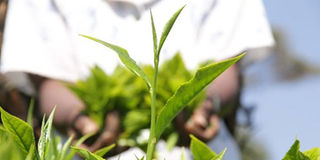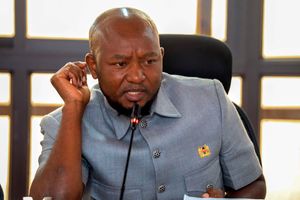
A farmer picks tea leaves at her farm at Gathuthi village in Nyeri county on September 16, 2013.
The control of millions of dollars in earnings from tea exports and the multi-billion tender deals are some of the reasons the contest for the Kenya Tea Development Agency (KTDA) chairperson’s position has over the years been hotly contested.
A top gun in the agency also has control of assets worth billions of shillings owned by KTDA on behalf of the small-scale tea growers which generate millions in revenue annually.
Still, influence by tea brokerage firms’ operators at the Mombasa Tea Auction – a regional trading floor for – Ethiopia, Mozambique, Rwanda, Burundi, Democratic Republic of Congo, Uganda and Madagascar - has a bearing on who ascends to the influential position.
The government has had a big say in the running of KTDA even though it is registered as a private company that is supposed to be free from interference by the state.
In 21 counties, more than 680,000 small-scale tea growers who supply their produce to 69 KTDA-managed factories, elect zonal directors every three years, who in turn elect regional directors who finally will pick one among themselves as chairperson and vice chairperson of the agency.
Mr Enos Njeru, the chairman is defending his position in a battle with regional board representatives – Gabriel Kagombe (who is also Gatundu South Member of Parliament), Mr Erick Chepkwony, Mr Chege Kirundi and Mr John Wa Susana.
The vested interests of stakeholders in the industry show how powerful the holder of the position is, with intense lobbying to elbow in one of their own or be associated with the chairperson one way or the other.
President William Ruto and Deputy President Rigathi Gachagua have been rooting for reforms in KTDA in a bid to ensure farmers earn more from the sale of their produce.
“A lot of powers are vested in the office of the KTDA chairman which includes travelling with the President during foreign trips to pitch for new markets for the Kenyan teas. That alone gives one with political ambitions a lot of visibility and power at the national, regional and international arena” Mr Cheruiyot Baliach, a KTDA director said.
Mr Erick Langat, a former KTDA director and also an immediate former chairman of the Kapkoros tea factory in Bomet county said the chairperson’s position was an influential one as one had a grip on what goes on in the tea industry.
“Being one of the leading foreign exchange earners for the country, the position of KTDA chairman attracts a lot of business opportunities, thus the interests it generates from various stakeholders behind the scenes,” Mr Langat said.
Mr Joseph Kinyanjui, a former KTDA Company Secretary said the agency board members should preside over a shift of factory production lines from traditional to specialty teas that fetch higher prices in the export market.
“Boardroom politics aside, there is a need to re-look at the Kenyan tea lost in the Mombasa tea auction, a platform where players from outside Kenya buy, then blend and brand it before offloading it to the export market” Mr Kinyanjui said.
He said in a recent interview that the powers vested on the board should be used to the benefit of the farmers and not individual directors.
“The chairman has a major say on the issues relating to brokerage firms acting on behalf of the agency, business and employment opportunities in the agency” a second term director who did not want to be named stated on Thursday.
KTDA Holdings Limited is an investment company with many subsidiaries and is owned by the tea farmers as shareholders. The farmers have repeatedly over the years claimed that they have not benefited from the subsidiaries.
The Kenya Tea Packers (Ketepa) blends, packages and distributes high-quality tea in the local and foreign market is a KTDA subsidiary company, so is Chai Trading Company Limited, a Mombasa-based company that deals in warehousing, blending and export of tea.
Majani Insurance Brokers Limited, providing insurance brokerage services, Greenland Fedha Limited which provides credit facilities to farmers is also owned by the agency that runs Chai Logistics Centre and KTDA Management Services.
KTDA also owns and operates KTDA Foundation as a non-profit company that handles corporate social responsibility programs for the agency.
Tea Machinery and Engineering Company (TEMEC) deals with the supply, erection and commissioning of all kinds of equipment for the processing of tea in factories whereas KTDA Power Company Limited (KTPC Power) manages hydropower projects owned by factories and invests in the energy sector.
Mr David Karanja, a tea grower in Nyeri, said in the past there had been cases of conflict of interest involving KTDA chairmen and their businesses
“We have cases of conflict of interest with the KTDA chairman or directors having brokerage companies registered in their names or by proxy which are directly trading with the agency yet no action is taken” said Mr Karanja.
Mr Karanja added: “One of the biggest problems is that in a situation where there is a change of guard in the Presidency, the new power barons want a piece of the action in the industry and are keen to push out the old players and introduce new ones”
Some of those involved, Mr Karanja said, are so entrenched in KTDA that it is almost impossible to push them out as they more or less decide who becomes elected to the seniormost position in the board.
The state has for years now insisted that there was a need to end the perennial cases of alleged corruption in the agency that had led to small-scale tea growers being short-changed in prices of green tea leaves supplied to the factories and bonus payout at the end of the year.
“As a matter of fact, the government has a vested interest in the running of KTDA and often plays a major role in deciding who is elected the chairman of the board,” he added.
In July last year, the then KTDA chairman David Ichohi was removed in a boardroom coup that was said to have had a heavy government hand and replaced by Mr Enos Njeru in what indicated the persistent leadership wrangles were not about to end. It was also a pointer to state influence in the affairs of the agency.
The changes on July 17, 2023, saw Mr Njeru, a director from Zone Six and a Certified Public Accountant, elevated to the helm of the company as the board chairman for a period of three years.
“I am aware that these sudden actions by the board members are subject to outside influence and political gimmicks which if allowed will affect my rights and fundamental freedom” the ousted official was to say in an affidavit in a case he filed in the High Court challenging his ouster.
“It was all politics. I did not see the reason why I was pushed out. I am a man of integrity and I have always cooperated with the government as opposed to other leaders” Mr Ichoho said after his removal.
In a case of state interference in the running of the agency, Mr Ichoho admitted that he had been forced to sign a resignation letter bringing to an end his term, a year before it was due to lapse, with his having assumed office in June 2021.
It has been claimed that the ouster had to do with the government’s unsuccessful efforts to access dollars the agency held in a bank account, so as to steady the shilling which was in a free fall. The agency's top guns are said to have declined.
“Apart from the dollar currency shortage the government faced, there was the case of import of fertiliser under the government subsidy programme for the tea growers. Those involved in the deal saw Mr Ichoho as an impediment and he had to be elbowed out. That is why no administrative action was later taken against him,” a board member privy to the dealings then stated.
On Thursday, KTDA announced it had imported 97,000 metric tons of fertilisers for the 2024-2025 financial year to be supplied to farmers in readiness for the expected short rains.
A total of 880,000 metric tons were imported last year in what demonstrates the business opportunities in the sector for tender-prenuers.
The government is seeking to repeal the Tea Act, 2020 to pave the way for the direct export of tea by industry players bypassing the Mombasa Tea Auction, and removal of the reserve prices that have been an impediment to sale of tea.
A bulk of the tea that has not been sold at the auction is from KTDA-managed factories, most of it is from the West of Rift, which has fuelled the politics in the agency.
Those from the West of Rift claimed their tea was being branded as of poor quality in what is meant to pave the way for those from the East of Rift to be sold as premium teas.
Kenya is dependent on the black CTC (Curt, Tear and Curl) tea for export markets especially – United Kingdom, Pakistan, Egypt, Sudan, Poland and Kazakhstan.
New markets have opened up in Morocco, South Africa, China, Ghana, Nigeria, India, Switzerland and Australia with the government directing diplomats to market the produce in their stations.









